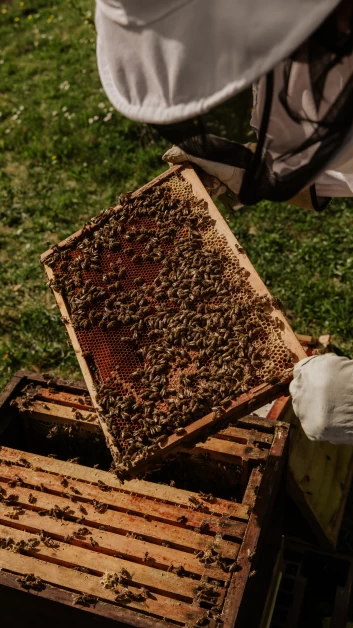Table of Contents
Manuka honey is a natural and easily accessible option that offers numerous health benefits. It has been suggested that manuka honey can reduce the risk of heart disease and diabetes, support a healthy gut, and even serve as an alternative to antibiotics. In this article, we will explore the health-protective powers of manuka honey, how to choose the best varieties, and different ways to incorporate this sweetener into your meals, snacks, and drinks.
The Benefits of Manuka Honey
1. Helps Prevent and Treat Metabolic Syndrome
Metabolic syndrome (MetS) is a cluster of risk factors for heart disease and diabetes. Research suggests that manuka honey may prevent and manage MetS in the following ways:
- Blood sugar regulation: Manuka honey has a lower glycemic index (GI) than sugar, meaning it does not cause a spike in blood sugar levels. It also helps enhance insulin sensitivity, preventing weight gain when consumed moderately.
- Improved lipid metabolism: Manuka honey lowers levels of triglycerides and LDL (“bad”) cholesterol while raising HDL (“good”) cholesterol. This helps prevent the buildup of cholesterol in the arteries, reducing the risk of heart problems.
- Reduced oxidative stress: Manuka honey’s antioxidative properties help reduce oxidative stress, which is an imbalance between cell-damaging free radicals and the body’s ability to counter their harmful effects.
2. May Prevent Heart Disease
Manuka honey contains over 180 substances, including natural sugars, vitamins, minerals, and phytochemicals. Its antioxidant and anti-inflammatory compounds help protect against atherosclerosis, which is the buildup of fatty substances in the arteries. Atherosclerosis is a risk factor for coronary artery disease (CAD), which can lead to angina and heart attacks.
3. Might Protect Against Antibiotic Resistance
Antibiotic resistance is a growing concern, and manuka honey may offer a potential solution. Studies have shown that manuka honey can improve cough frequency and severity compared to over-the-counter medicines and antibiotics. Additionally, researchers have discovered an antimicrobial compound from honeybees that could serve as the basis for new antibiotics, helping to curb antimicrobial resistance.
4. Supports a Healthy Gut
Manuka honey possesses prebiotic properties, which means it helps ferment healthy gut bacteria. This fermentation process aids in the breakdown of food and absorption of nutrients. Prebiotics like manuka honey have been linked to a strong immune system and enhanced mental well-being.
The Nutrition of Manuka Honey
One tablespoon of manuka honey contains the following nutrients:
- Calories: 63.8
- Fat: 0g
- Sodium: 0.8mg
- Carbohydrates: 17.3g
- Fiber: 0.04g
- Added sugars: 0g
- Protein: 0.1g
Manuka honey also contains 31 minerals, including phosphorus, calcium, potassium, and magnesium. However, it is important to note that manuka honey does not provide a significant percentage of these nutrients in your diet. Further research is needed to fully understand the benefits of manuka honey’s complex makeup.
Risks of Manuka Honey
When purchasing manuka honey, it is essential to ensure its quality and purity. It is recommended to talk to the beekeeper, especially when buying from local farmers’ markets, to learn about the honey’s origin and handling. Always read the ingredients to ensure that the honey has not been mixed with other additives.
It is crucial to avoid giving honey to children under 12 months of age due to the risk of Clostridium botulinum spores. These bacteria can multiply in an infant’s immature digestive system and cause serious illness.
Tips for Consuming Manuka Honey
Manuka honey can be enjoyed in various ways, including:
- Sweetening beverages: Add manuka honey to tea, coffee, or smoothies for a natural and flavorful sweetener.
- Dressing and sauces: Whisk manuka honey into homemade vinaigrette dressings and sauces for a touch of sweetness.
- Drizzling over food: Drizzle manuka honey over oatmeal, overnight oats, pancakes, fresh fruit, chia seeds, or avocado pudding for added flavor.
- Energy balls: Stir manuka honey into energy balls made with nut or seed butter, oats, dried fruit, spices, and chopped dark chocolate for a nutritious and delicious snack.
- Roasting and glazing: Use manuka honey to glaze carrots, beets, walnuts, or cashews, or use it to make kale chips for a healthy and flavorful twist.
- Baking: Manuka honey can be used as a substitute for sugar in certain baked goods. Replace one cup of sugar with one-half to two-thirds cup of manuka honey and reduce the liquid in the recipe accordingly.
- Cocktails: Experiment with manuka honey in cocktails, such as honey lime margaritas, honey-kissed cosmos, or bee’s knees made with honey, gin, ginger, and lemon juice.
Incorporating manuka honey into your diet can add both taste and potential health benefits to your meals and snacks.
Conclusion
Manuka honey offers a range of health benefits, including treating infections, fighting metabolic syndrome, preventing artery hardening, and supporting a healthy gut. It may also serve as an alternative to antibiotics. While manuka honey contains some nutrients, further research is needed to fully understand its complex makeup. When consuming manuka honey, it is important to ensure its quality and purity. By following these tips and incorporating manuka honey into your diet, you can enjoy its sweet taste and potential health-promoting properties.


